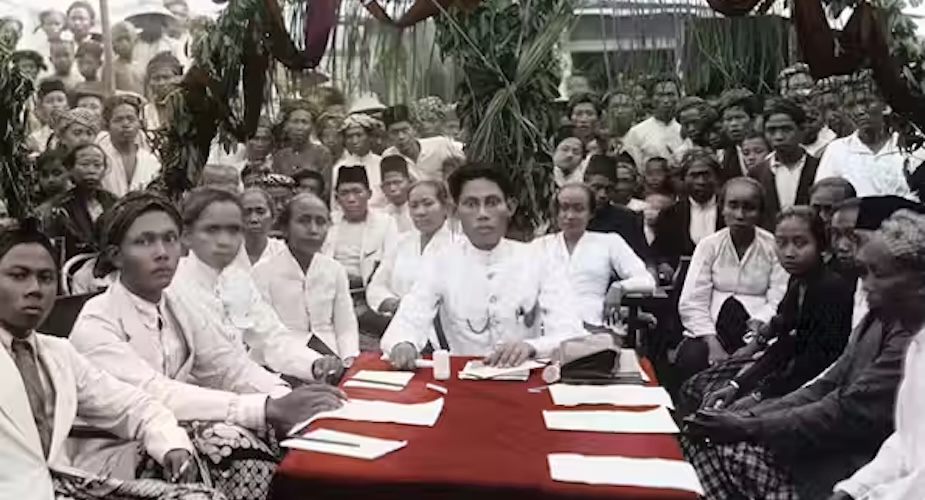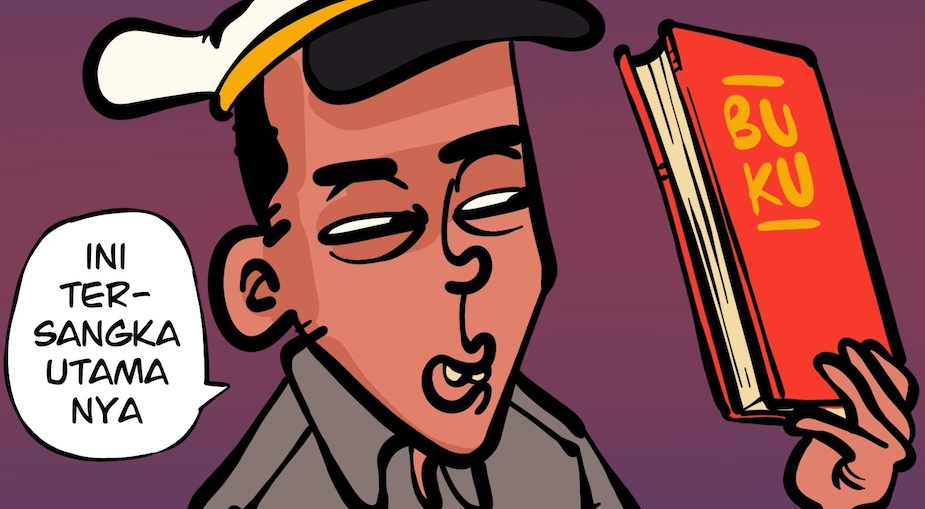Acehnese living in Indonesia face fear and misunderstanding
Jennifer Donohoe
He used to be a truck driver in Aceh. Now, Ibrahim is living in a nondescript Javanese town. He lives in daily fear of being killed or abducted. He cannot legally work because his identity papers were taken from him, and he is afraid that he would put his workmates in danger. Why? Ibrahim (not his real name – all names in this article have been changed to protect the interviewees) says it is partly because since 1999 he had been campaigning to defend victims of military brutality in Aceh. He also says it’s simply because he is Acehnese.
Ibrahim’s story is similar to that of many Acehnese who have left the province because they fear persecution or simply want to escape the conflict. Even ‘ordinary’ Acehnese with no political affiliation have fallen victim to military operations. Others leave simply because they can’t support their families.
When martial law was declared on 18 May 2003, those who came under immediate threat were not just members of the Free Aceh Movement (Gerakan Aceh Merdeka, GAM). Members of vocal non-governmental organisations, particularly those involved in human rights or independence referendum campaigns, also felt they were targets.
They had good reason. Two activists interviewed for this article had been arrested. One would only say that he was ‘not treated like a human being by those soldiers’. The other gave a chilling story of torture for days on end. He witnessed other prisoners being raped, tortured or killed.
Aceh is dangerous not only for activists and separatists. Normal civilians, too, often fall victim, either caught in crossfire or deliberately targeted when they are suspected of assisting GAM. In recent reports, the military, or TNI, has acknowledged that at least 147 civilians were killed and 155 wounded in the 10 months to August 2004. Human rights organisations in the province estimate that the figure is much higher.
Violence and intimidation is not the only reason people leave. Working and earning a living in a conflict zone is difficult. Sometimes it’s impossible. Restrictions on people’s movements means that they are often unable to access markets to sell their produce. In some cases, they are afraid to leave their homes altogether, for fear of being caught in crossfire.
Faisal’s story
Faisal now lives in Central Java. He left Aceh because he was unable to earn a living there: ‘When you have to stay in your house after dark, and you cannot travel from place to place, it is impossible to run a business. My family lives mainly on income from fishing, but when the military is in control, we are often prohibited from going out to fish.’
Before the most recent military campaign, Faisal also made money from tourists who used to visit Aceh for surfing or to enjoy the beautiful scenery. Now the tourists are gone due to regulations prohibiting international visitors from entering the province.
The unfortunate truth, however, is that it is not always much easier for Acehnese to live in other areas of Indonesia. Due to the ongoing conflict in Aceh, and what they see as racial stereotyping, Acehnese often feel unsafe, unwanted and misunderstood when they leave home. It’s difficult for them to find work and make friends, and they often conceal their origins to avoid trouble.
Conditions are even worse for activists who try to continue their political, human rights or humanitarian activities outside Aceh. They frequently become the targets of monitoring and intimidation by security forces. Often, they go ‘underground’ in response.
During the past year, Ibrahim has been followed several times by unidentified persons who threatened him. Once, two of these men detained him and accused him of being a GAM member. Another time, he recognised the men as intelligence agents from Banda Aceh. Many other Acehnese outside of Aceh have been threatened and harassed, become victims of police or military violence or been arrested without reason. But they are afraid to speak out.
Red alert
The morning after martial law was declared in Aceh in 2003, the governor of Jakarta declared red alert status in the city against possible GAM terrorist attacks. An order that residents should be alert to the activities of their Acehnese neighbours was transmitted right down to heads of neighborhood units. Residents were even empowered with the right to make citizen’s arrests of ‘suspicious’ Acehnese.
The result of this decree was a series of police raids in Jakarta, and random arrests elsewhere in Indonesia. According to Najib, a member of the Centre for Information on the Aceh Referendum (SIRA), the police used the decree to arrest anyone of Acehnese origin and extort money from them: ‘Some of my friends were arrested and were unable to pay straight away. They were kept in custody without reason until someone was able to bring the money for their release.’
The decree was strongly criticised by human rights groups, who pointed out that it was discriminatory and violated the public’s right to live without fear.
Some Jakartans were unwilling to join in the witch-hunt. Many, however, were eager to help the police. One man interviewed by a local newspaper said of his Acehnese neighbour: ‘He is a businessman but no one is sure what he really does. He seems to be a good person, but that doesn’t mean we trust him completely.’
Even those Acehnese who manage to stay out of the gaze of the law do not always find it easy to live in Indonesia. Racial stereotypes and a general lack of knowledge about the conflict in Aceh have led many Indonesians to fear the Acehnese. Even in big c?ties Acehnese people are likely to face several stereotypes.
Ethnic stereotyping
The first, of course, is that they are GAM members. The second is that they are marijuana dealers (Aceh is known for its cultivation of marijuana, and the leaves of the plant were traditionally used as a herb for cooking). ‘My two children, although they are half-Javanese, are teased as ‘GAM children’,’ said a noted Acehnese human rights activist in a recent newspaper article. Another man said that police looking for marijuana raided his boarding house, simply because there were Acehnese students living there. They found nothing.
Many Acehnese choose to hide their identity altogether. When I was interviewing Faisal, an old woman came to the door selling brooms. When she asked him where he was from, he immediately said ‘Sumatra’. I asked him why he had said this and he replied, ‘It is just easier. If you say you are from Aceh, people are either afraid or they ask you stupid questions. All they know is what they see on television. I also prefer that not too many people around here know I am from Aceh, just in case.’
In Indonesia all citizens must carry an identity card (KTP) to obtain a job, open a bank account, get married or perform a multitude of other tasks. During the military campaign, the KTPs of all Acehnese were declared invalid and they were issued with a new and distinctive ‘Red and White KTP’, so named because it was printed in the colours of the Indonesian flag.
As a result, any Acehnese travelling outside Aceh are readily identifiable. Most Acehnese try to change their identity card as soon as they leave the province, but it is an expensive task. ‘Usually a KTP costs about Rp 10,000, but for me they charged Rp 100,000,’ said Faisal. He also had to get a friend to organise his new KTP, because he was too scared to do it himself.
Going home?
Many Acehnese are desperately unhappy living outside Aceh, but are unable to return because they are afraid of being arrested or being unable to earn a living. ‘I miss the food’, grumbled Ibrahim, who despite his insecure position wants to go back to Aceh as soon as possible.
Najib planned to return to Aceh last August when he heard that the ‘civil emergency’ status might improve the security situation. He changed his mind, however, when a group of aid workers and civilians, including some of his friends, were arrested in Banda Aceh.
Some reports even suggested that torture, beatings, disappearances and murder increased during the months following the change to civil emergency status. More than 30,000 soldiers remain deployed in the province, and there are many reports of pro-Indonesia militia groups being established.
Ironically, the Indonesian government treats Aceh as if it is a different country and the Acehnese as if they are foreigners. The general population gets very little information about the province in terms of the real lives and culture of the Acehnese. Government officials make little distinction between ordinary Acehnese citizens and armed separatists. Stereotypes are encouraged. If Indonesia wants Aceh to remain a part of the republic, then it will need to improve the way Acehnese are treated.
Jennifer Donohoe (donohoejennifer@yahoo.com.au) is an Australian consultant working in Jakarta.











